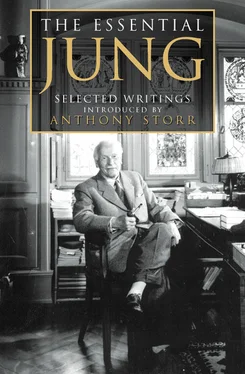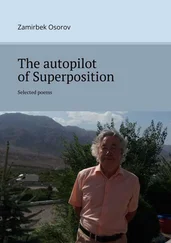1 ...7 8 9 11 12 13 ...28 The results of occupational therapy in mental hospitals have clearly shown that the status of hopeless cases can be enormously improved. And the much milder cases not in hospitals sometimes show encouraging results under psychotherapeutic treatment. I do not want to appear overoptimistic. Often enough one can do little or nothing at all; or again, one can have unexpected results. For about fourteen years I have been seeing a woman, who is now sixty-four years of age. I never see her more than fifteen times in the course of a year. She is a schizophrenic and has twice spent a number of months in hospital with an acute psychosis. She suffers from numberless voices distributed all over her body. I found one voice which was fairly reasonable and helpful. I tried to cultivate that voice, with the result that for about two years the right side of the body has been free of voices. Only the left side is still under the domination of the unconscious. No further attacks have occurred. Unfortunately, the patient is not intelligent. Her mentality is early medieval, and I was able to establish a fairly good rapport with her only by adapting my terminology to that of the early Middle Ages. There were no hallucinations then; it was all devils and witchcraft.
* Alfred Binet, Alterations of Personality, tr. Helen Green Baldwin, London: 1896, p. 147.
Part 2. Jung’s Involvement with Freud and His Divergence from Freud’s Theories
During the years 1907–13, Jung was closely associated with Freud, and deeply influenced by him. The story of the rise and fall of their relationship can be traced and studied in The Freud/Jung Letters. But, although Jung always acknowledged his debt to Freud, and paid tribute to his originality, he was never a whole-hearted “Freudian.” For example, in his introduction to The Psychology of Dementia Praecox, dated July 1906, Jung writes:
Fairness to Freud, however, does not imply, as many fear, unqualified submission to a dogma; one can very well maintain an independent judgment. If I, for instance, acknowledge the complex mechanisms of dreams and hysteria, this does not mean that I attribute to the infantile sexual trauma the exclusive importance that Freud apparently does. Still less does it mean that I place sexuality so predominantly in the foreground, or that I grant it the psychological universality which Freud, it seems, postulates in view of the admittedly enormous role which sexuality plays in the psyche. As for Freud’s therapy, it is at best but one of several possible methods, and perhaps does not always offer in practice what one expects from it in theory. [CW 3, Foreword, p. 4]
And, in a letter to Freud dated 5 October 1906, Jung wrote:
What I can appreciate, and what has helped us here in our psychopathological work, are your psychological views, whereas I am still pretty far from understanding the therapy and the genesis of hysteria because our material on hysteria is rather meagre. That is to say your therapy seems to me to depend not merely on the affects released by abreaction but also on certain personal rapports, and it seems to me that though the genesis of hysteria is predominantly, it is not exclusively sexual. I take the same view of your sexual theory. [ The Freud/Jung Letters, pp. 4–5]
Freud originally supposed that hysteria was caused by trauma, and that the trauma was both literal and sexual. By the end of 1897, however, Freud realized that the stories which his hysterical patients told him of incestuous seduction were fantasies rather than actual occurrences. Freud then postulated that the cause of neurosis was the “fixation” of the patient at an early stage of emotional development, but continued to assume that the reason for this fixation was to be found in the events of the patient’s early childhood without reference to the present. Jung took a different view.
“Psychoanalysis and Neurosis” CW 4, pars. 557–75
After many years’ experience I now know that it is extremely difficult to discuss psychoanalysis at public meetings and at congresses. There are so many misconceptions of the matter, so many prejudices against certain psychoanalytic views, that it is an almost impossible task to reach mutual understanding in a public discussion. I have always found a quiet conversation on the subject much more useful and fruitful than heated arguments coram publico. However, having been honoured by an invitation from the Committee of this Congress to speak as a representative of the psychoanalytic movement, I will do my best to discuss some of the fundamental theoretical problems of psychoanalysis. I must limit myself to this aspect of the subject because I am quite unable to put before my audience all that psychoanalysis means and strives for, and its various applications in the fields of mythology, comparative religion, philosophy, etc. But if I am to discuss certain theoretical problems fundamental to psychoanalysis, I must presuppose that my audience is familiar with the development and the main results of psychoanalytic research. Unfortunately, it often happens that people think themselves entitled to judge psychoanalysis who have not even read the literature. It is my firm conviction that no one is competent to form an opinion on this matter until he has studied the basic writings of the psychoanalytic school.
In spite of the fact that Freud’s theory of neurosis has been worked out in great detail, it cannot be said to be, on the whole, very clear or easy to understand. This justifies my giving you a short abstract of his fundamental views on the theory of neurosis.
You are aware that the original theory that hysteria and the related neuroses have their origin in a trauma or sexual shock in early childhood was given up about fifteen years ago. It soon became evident that the sexual trauma could not be the real cause of the neurosis, for the simple reason that the trauma was found to be almost universal. There is scarcely a human being who has not had some sexual shock in early youth, and yet comparatively few develop a neurosis in later life. Freud himself soon realized that many of the patients who related an early traumatic experience had only invented the story of the so-called trauma; it had never occurred in reality, but was a mere creation of fantasy. Moreover, on further investigation it became quite obvious that even if a trauma had actually occurred it was not always responsible for the whole of the neurosis, although it does sometimes look as if the structure of the neurosis depended entirely on the trauma. If a neurosis were the inevitable consequence of the trauma it would be quite incomprehensible why neurotics are not incomparably more numerous than they are.
The apparently heightened effect of the shock was clearly due to the exaggerated and morbid fantasy of the patient. Freud also saw that this same fantasy activity manifested itself relatively early in bad habits, which he called infantile perversions. His new conception of the aetiology of neurosis was based on this insight, and he traced the neurosis back to some sexual activity in early infancy. This conception led to his recent view that the neurotic is “fixated” to a certain period of his early infancy, because he seems to preserve some trace of it, direct or indirect, in his mental attitude. Freud also makes the attempt to classify or to differentiate the neuroses, as well as dementia praecox, according to the stage of infantile development in which the fixation took place. From the standpoint of this theory, the neurotic appears to be entirely dependent on his infantile past, and all his troubles in later life,his moral conflicts and his deficiencies, seem to be derived from the powerful influences of that period. Accordingly, the main task of the treatment is to resolve this infantile fixation, which is conceived as an unconscious attachment of the sexual libido to certain infantile fantasies and habits.
Читать дальше












